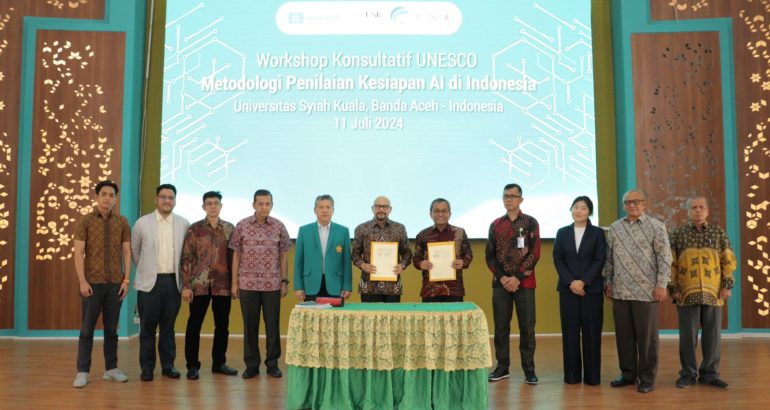Banda Aceh, July 11, 2024 – The Department of Informatics, FMIPA Universitas Syiah Kuala (USK), hosted the UNESCO Consultative Workshop on the Readiness Assessment Methodology for Artificial Intelligence in Indonesia. This event was a collaboration between UNESCO, KOMINFO, USK, and KORIKA.
USK Rector, Prof. Dr. Ir. Marwan, emphasized USK’s commitment to participating in technological advancements in Indonesia, particularly regarding AI ethics and governance. The Head of the Aceh Communication, Informatics, and Encryption Agency, Mr. Marwan Nusuf, B.HSc M.A, highlighted the importance of cross-sector collaboration to ensure AI development in Indonesia aligns with ethical principles and social responsibility.

Prof. Hammam Riza, President of KORIKA, underscored that this workshop is a strategic step in preparing Indonesia to adopt AI. Prof. Hammam also welcomed the signing of the Memorandum of Agreement (MoA) between KORIKA and FMIPA USK, as well as the Implementation Agreement (IA) between KORIKA and the Department of Informatics USK, aimed at strengthening cooperation in AI research and development in Indonesia.
Prof. Dr. Taufik Fuadi Abidin, Dean of FMIPA USK, explained the importance of human resource readiness in facing AI advancements. The Department of Informatics USK has been preparing AI talent since 2019 through the Master’s Program in Artificial Intelligence, which has graduated several individuals with outstanding achievements. In 2024, the Ministry of Communication and Informatics, in collaboration with USK, is providing 20 full scholarships for new AI Master’s students.


The workshop featured three main speakers: Ms. Undral Ganbaatar from UNESCO, who discussed the UNESCO Recommendations on AI Ethics and RAM, Mr. Aries Kusdaryono from the Ministry of Communication and Informatics, who presented on AI Governance Strategy and Implementation in Indonesia, and Mr. Adya Danaditya from KORIKA, who elaborated on the Application of RAM and AI in Real Life. The workshop not only focused on delivering material but also involved participants in filling out questionnaires and engaging in in-depth discussions on “Legal, Regulatory, and Socio-Cultural Effects of AI” and “How to Adopt and Invest in AI in Education, Research, and Infrastructure.” This activity aimed to collect qualitative and quantitative data that will be used in UNESCO’s AI readiness assessment report for Indonesia.


